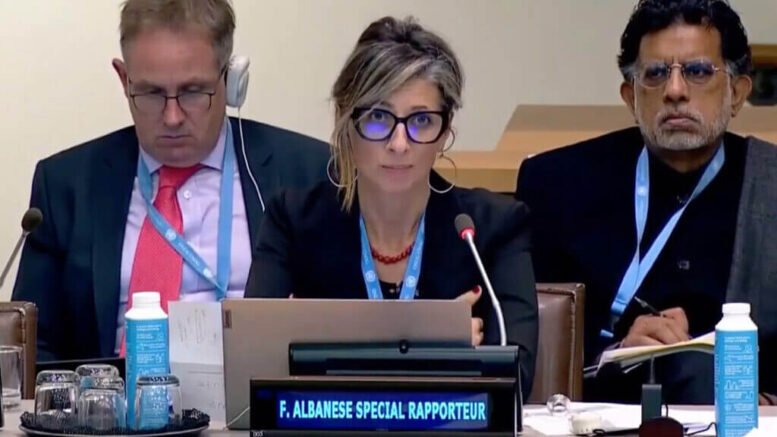United Nations Special Rapporteur on Palestine: Israel’s illegal prison practices in the occupied Palestinian territories have turned into an open prison

The report presented by Francesca Albanese, the United Nations Special Rapporteur on Palestine, to the United Nations Human Rights Council last June, denounces Israel's use of various means, including physical, bureaucratic, military, and surveillance measures, to "de-Palestinianize" the occupied territory, thus endangering the existence of Palestinians as a people.
Albanese provides a detailed view of the system of control composed of multiple and interconnected levels of confinement, which has transformed the lives of Palestinians into a continuum of confinement, akin to an open-air prison under constant surveillance. The report documents several actions by Israel, such as the arbitrary seizure of land and the forced displacement of Palestinians, falling under the framework of settlement colonialism.
The Special Rapporteur emphasizes the importance of the international community recognizing the illegality of Israeli occupation and apartheid and states that merely addressing some of the most severe consequences of these actions is not enough; it is necessary to put an end to them to restore the rule of law and justice.
The report also addresses the issue of violations of international law by Palestinian authorities, contributing to reinforcing the regime imposed by the occupation.
One significant aspect of the report is the description of digital surveillance by Israel, which enhances control over the occupied territory. Palestinians are constantly monitored through closed-circuit cameras and other surveillance technologies, with intrusions even into their private spaces through monitoring of online activities and mobile phones. Albanese argues that the occupation has incentivized the development of powerful surveillance technologies by Israel, such as facial recognition, drones, and monitoring of social media. These surveillance practices, according to the Special Rapporteur, serve to facilitate the colonization of Palestinian territory.
Albanese's report updates the United Nations' documentation of Israeli policies and practices, highlighting arbitrary detentions, nighttime raids with arrests of minors, and the two-tier legal system in the West Bank, where Israeli citizens fall under the jurisdiction of civilian courts, while Palestinians are subject to the administration and judicial system of the occupying forces.
Finally, the report cites several ways to achieve the recommendations: the first is the abolition of the Israeli system that arbitrarily deprives Palestinians of their freedom in the occupied territory, and the second invites the Prosecutor of the International Criminal Court to examine the possible perpetration of international crimes described in the report.
Albanese had to conduct her study remotely, as Israel refused her entry to the occupied territory. Her report has sparked sharp criticism but has also been defended by experts in international law, who appreciate her immediate and specific application of international norms in a complex and contentious situation.
Calls for a just peace underscore the importance of disseminating the Special Rapporteur's report to raise awareness among elected political representatives and local media about the human rights situation in the Palestinian territories.

